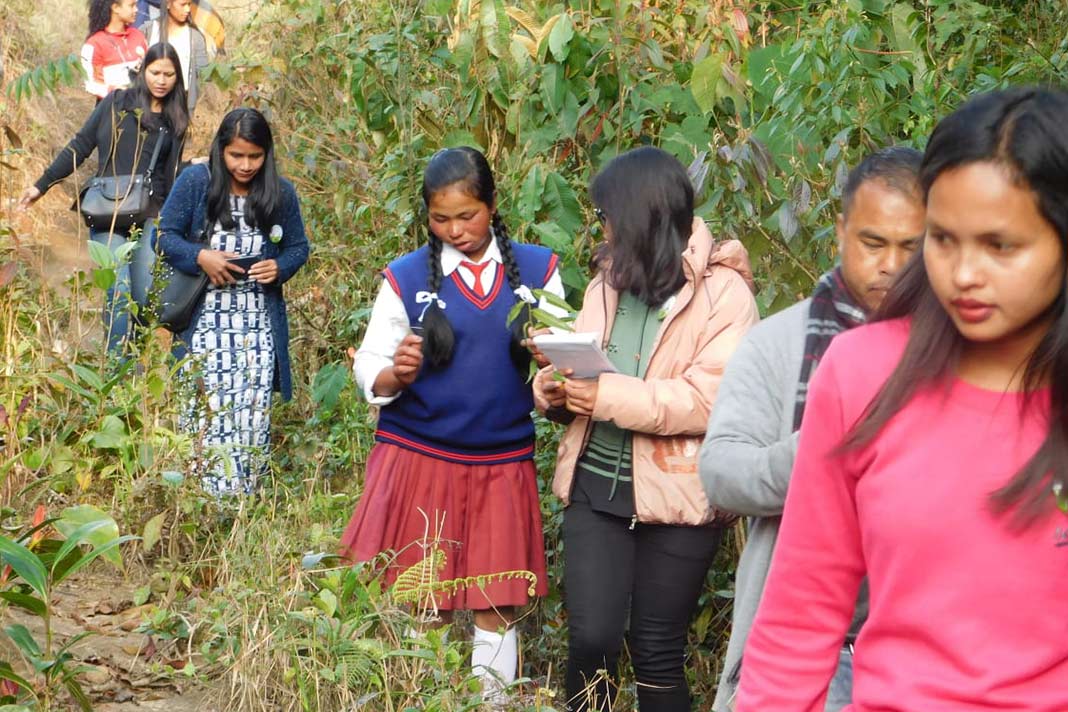Youths trained to identify wild edibles

Samanong is a small hamlet of about 50 households and is located on the top of the rolling hills of Amlarem subdivision of West Jaiñtia Hills. The hills where the village is located are divided by the river Umngot which is also serves as the boundary between the East Khasi and West Jaiñtia hills of Meghalaya. The river Umngot which cut through the hills also create a breathtaking and deep canyon between the two districts, the entire area is a feast for the eye.
The Society for Urban and Rural Empowerment (SURE) organised a Youth Leadership Training program which started on March 9 and was attended by the youths from the different parts of the district. The program was supported by the Nehru Yuva Kendra Jowai and the youths and the community enthusiastically participated in making the program a success.

The valedictory program was graced by Saron Paswet Member District of the Jaiñtia Hills Autonomous District Council and local MDC who has praised the organisation for organising the program in a place such as Samanong which is not only a small village but it is also one of the few village which is yet to be connected by surfaced road. He encourage the youths to make the best use of what they have been taught during the training program. He was also pleased to know the youths were not only trained in issues like decision making and problem solving but they were also trained in job oriented program which is the need of the hour because of the lack of employment opportunities for the youths now a days. The first day of the program started with small inauguration session which was shared by Pasqua Lamare who is also a program coordinator and was followed by a welcome speech by Stan Dkhar Waheh Chnong of Samanong village. H.H. Mohrmen the Secretary of Society for Urban and Rural Empowerment gave a keynote speech and described about the different sessions in the entire program and was followed by a speech from Heipor Rasmut National Youth Volunteer of Nehru Yuva Kendra.

The first part of the program was an icebreaking session in which the youths who attended the program introduced each other to the entire group; the next part of the program was on decision making and problem solving which was led by Corniki Slong program associate of SURE. The following program was an interested one and the youths were took for what is called as the Agro Biodiversity Walk in which they trekked about 7 KM through the village reserve forest and the suburb of the village. The objective was to help youths identify wild edibles which are found in the forest which include vegetables, fruits and plants which have medicinal properties.

Before the walk, the youths were taught about the importance of consuming the minimum of five food groups of the ten food groups from the food that are locally available by Daka Bareh program associated of the organisation. The walk was led by the elders of the village which includes Shri Stand Dkhar the headman of the village who helped identify the wild edibles for the youths. In the evening the cultural program was attended by the community in which the youths and the villagers show their talents, the icing in the cake was the tradition orchestra played by the music club of the village.
The day started with a yoga session led by Kamnipaia Challam who a qualified a yoga master of the Art of living foundation. Then followed by training on Bokashi farming and the following session was training on making Bokashi composting led by Habandajop Lyngdoh. The training YLT proram also comprises of sessions on Mushroom cultivation, Career Councelling, sessions on substance abuse and HIV/AIDS.
The valedictory session was chaired by Waiphang Shadap proram associate SURE and other who spoke were Real Sing Muksor and Somja Phawa also program associate of the organisation. The Chief Guest also distributed certificates to the more than forty youths from the villages like Wahiajer, Nongkhroh, Mupyut, Samanong, Mukhap and Jowai attened the program.


It may be mentioned that although Samanong is only about 15 KM away from Jowai the District Headquarter, yet the road to the village is still a kacha road which only four-wheeler vehicles can travel especially during summer. But in spite of all the difficulties, the people in the community are hard working and earn their livelihood mainly from farming.

Leave a Reply